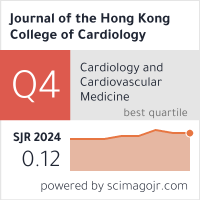Abstract
Tea, produced from the tea plant Camellia sinensis, has been consumed as a popular beverage world wide for thousands of years. Catechins are the major constituents in tea that contribute to its biological effects. The anti-thrombogenic, anti-inflammatory anti-hypertensive, and protective effects of tea on endothelium have been widely investigated for decades. Although studies have produced inconsistent results of the protective effect of tea on the cardiovascular system, a relationship between tea consumption and inhibition of cardiovascular diseases has been found in both animal and human studies. The mechanisms of action of tea have also been elucidated in cellular and molecular levels. In this paper, the nutraceutical and medical effects of tea on the prevention and treatment of cardiovascular diseases were reviewed.
Recommended Citation
Liyan Song, Bernard MY Cheung, Marcel WL Koo, Chu-Pak Lau, Tea and Cardiovascular Diseases Journal of the Hong Kong College of Cardiology 2022;14(2) https://doi.org/10.55503/2790-6744.1101
Creative Commons License

This work is licensed under a Creative Commons Attribution-Noncommercial-No Derivative Works 4.0 License.



